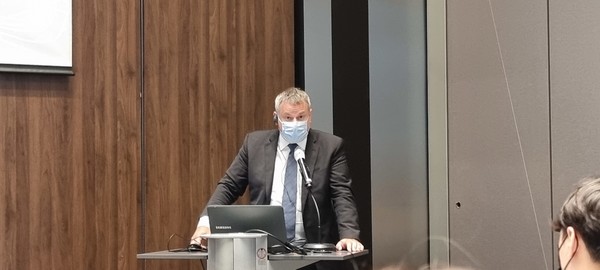The five-year survival rate of breast cancer in Korea is 86.6 percent, higher than that of the Organisation for Economic Co-operation and Development (OECD) average at 84.5 percent.
However, the five-year relative survival rate when diagnosed with advanced or metastatic breast cancer is only 30 percent in Korea, about similar to the OECD average.
Therefore, the treatment goal for advanced or metastatic breast cancer in Korea is to extend the progression-free survival (PFS) and overall survival (OS) while minimizing the side effects of treatment in consideration of the characteristics of the patient's tumor.
Novartis Korea held a media education session on CDK4/6 inhibitor Kisqali (ingredient: ribociclib) on Friday and explained that the treatment is the only CDK4/6 inhibitor that has demonstrated consistent OS prolongation regardless of menopause status, order of treatment, and concomitant medications in three phase 3 clinical trials.

During the Kisqali media session, Professor Dejan Juric at Massachusetts General Hospital participated as a speaker and shared the design of the three phase 3 MONALEESA clinical studies and the meaning of extending the OS period.
In the MONALEESA-2 phase 3 clinical study, the combination therapy of Kisqali and Letrozole maintained OS benefit regardless of dose change in the primary treatment of postmenopausal hormone receptor-positive (HR+)/human epidermal growth factor receptor 2-negative (HER2−) metastatic breast cancer patients, accrding to Juric.
"As a result of a long-term follow-up study of 79.7 months, the median OS in the Kisqali combination therapy group was 63.9 months, which was longer than 51.4 months in the control group by more than one year."
Juric stressed that the prolongation of survival for Kisqali was also confirmed in the MONALEESA-3 study, which compared Kisqali plus fulvestrant and placebo plus fulvestrant in postmenopausal HR+/HER2- metastatic breast cancer patients who had never received endocrine therapy or received only primary endocrine therapy.
"As a result of long-term follow-up of 56.3 months, the median overall survival in the Kisqali combination group was 53.7 months, which was 12.2 months longer than the 41.5 months in the fulvestrant alone group," Juric said. "Also, as a result of long-term follow-up of about 5.9 years, in the final OS analysis, the median OS time of the patients who received first-line treatment with Kisqali combination therapy was 67.6 months, which was about 15.8 months longer compared to 51.8 months in the fulvestrant alone group."
Regarding patients with premenopausal and transitional HR+/HER2- advanced breast cancer, Juric stressed that a combination therapy of Kisqali and Aromatase Inhibitor (AI) showed a longer median overall survival compared to placebo and AI.
"As a result of a long-term follow-up study in the MONALEESA-7 clinical, the median overall survival in the Kisqali combination group was 58.7 months, which is approximately 10.7 months longer than the 48 months in the endocrine therapy alone group," he said.
Juric explained that Kisqali is the only CDK4/6 inhibitor with extended OS, proving its value as a first-line treatment for HR+/HER2- advanced and metastatic breast cancer patients.
"This is not a CKD4/6 inhibitor-type effect, but a special clinical benefit of Kisqali," Juric said. "After the results of three clinical studies related to Kisqali were published during the 2022 American Society of Clinical Oncology (ASCO), I have been prescribing Kisqali to my patients more actively."
This is because it is difficult to convince the patient to take another drug when Kisqali has proven data on prolonged OS through three clinical trials, he added.
Meanwhile, Novartis Korea stressed that the MONALEESA-7, which prolonged the OS period of premenopausal HR+/HER2- advanced breast cancer patients, is especially welcoming data in Korea as the proportion of young premenopausal breast cancer patients in Korea is much higher than in Western countries.
According to recent government data, the incidence rate of young patients in their 40s is high in Korea, and patients under the age of 40 account for about 10.5 percent, which is more than twice that of Western countries.
While endocrine therapy is recommended as the first-line treatment for premenopausal HR+/HER2- advanced and metastatic breast cancer patients, resistance and disease progression eventually develop.
Under these circumstances, Novartis stressed that Kisqali could become a meaningful treatment as it is the only breast cancer treatment that conducted clinical trials on premenopausal advanced and metastatic breast cancer.

